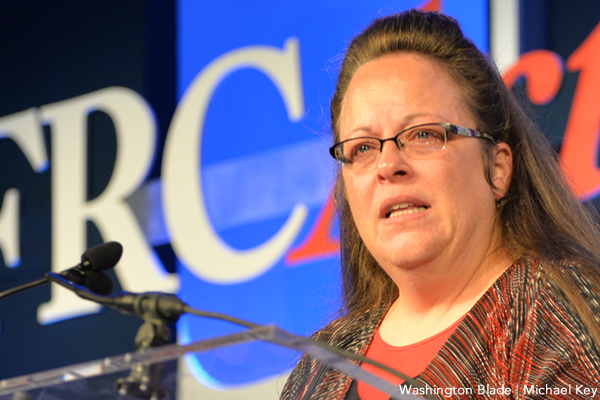National
Scouts victory!
Gay pressure on Boy Scouts wins rights for women and trans scouts, too


Tim Curran sued the Boy Scouts for discrimination 38 years ago. (Screen grab via CNN)
Thirty-eight years ago when Tim Curran first sued the Boy Scouts of America for anti-gay discrimination, no one could foresee the day when the Boy Scouts would transform into the simply named “Scouts of BSA” with next year’s admission of girls into the 2.3 million-member organization.
Founded in 1910 to promote leadership in boys, the earth virtually moved on Jan. 30, 2017 when the organization decided to admit transgender members. In a statement announcing the historic change, Chief Scout Executive Michael Surbaugh said in a statement that the policy using information on a person’s birth certificate to determine eligibility for programs was “no longer sufficient as communities and state laws are interpreting gender identity differently, and these laws vary widely from state to state.”
It was a shock that BSA acknowledged the community after a very long stubborn history of only listening to their religious sponsors and traditional views of masculinity. In 1973, Catherine Pollard volunteered to lead Connecticut Boy Scout Troop 13 when no one else would. When she officially applied to join, she was rejected, which the State Commission on Human Rights and Opportunities said was sex discrimination. BSA appealed. What, BSA counsel asked in 1985, could female scoutmasters understand of the biological changes experienced by young men?
BSA eventually relented in 1988 with a policy change that welcomed women into leadership roles. As of 2017, nearly one third of all volunteers are women.
But homophobia trumped sexism. “Boy Scouts of America,” the group consistently said, “believes that homosexual conduct is inconsistent with the obligations in the Scout Oath and Scout Law to be morally straight and clean in thought, word and deed.”
Then came Tim Curran. In 1980, the popular 18-year-old assistant scoutmaster in Berkeley, Calif., was outed by a local newspaper. The National Council found out and kicked him out.
“I was quietly outraged,” Curran wrote on July 21, 2015 on CNN.com, where he is an editor. Following a Boy Scout Handbook principle—if a Scout thinks “Rules and laws are unfair, he seeks to have them changed in an orderly manner” — Curran sued the Mount Diablo Boy Scout Council. Jon Davidson, then with the ACLU of Southern California, filed suit in April 1981, the first against the BSA alleging anti-gay discrimination.
The case lasted 17 years and in 1998, California’s Supreme Court ruled in favor of the Boy Scouts, which they deemed to be a private club that could determine its own membership rules, as opposed to a business with establishments open to the public.
The U.S. Supreme Court issued a similar 5-4 ruling in 2000 when James Dale sued. Then the high court decided that a private organization could exclude someone when “the presence of that person affects in a significant way the group’s ability to advocate public or private viewpoints.” And, the Court determined, opposing homosexuality is part of BSA’s “expressive message.” Admitting homosexuals would disrupt that message.
A firestorm ensued, at least in Los Angeles where the LAPD used the BSA for its youth programs. That irked out LA Council member Jackie Goldberg who noted that the city’s non-discrimination law did not allow such an association. A series of out police commissioners, starting with Dean Hansell, then Shelley Freeman, then Rob Staltzman, dug deep, held hearings— producing evidence that the BSA front group, Learning for Life, still linked back to BSA—and forced the city to cut ties.
LA County Sheriff Lee Baca, good on other LGBT issues, was smitten by the BSA and argued he would use pressure from within to change the BSA. That never happened.
Nationally, a grassroots groundswell bubbled up in April 2012 when Ohio mom Jennifer Tyrrell was removed as den leader of her son’s Cub Scout pack because she’s gay. GLAAD jumped on the case, generating publicity, creating petitions and forcing corporations and companies to look at their policies and associations with BSA. BSA board members, such as David J. Sims of the Ohio River Valley Council, resigned as a show of support for Tyrrell and her son.
On Oct. 4, 2012, KGO-TV reported that teenager Ryan Andresen of Moraga, Calif., was denied the Eagle Scout rank after coming out as gay. Another firestorm erupted, and BSA was caught lying, hardly in keeping with moral values. Andresen, meanwhile, went on The Ellen DeGeneres Show where he shared his story and was gifted $20,000 for his education.
By Feb. 2013, even religious sponsor United Methodist Church called for the BSA to drop its ban on gay scouts and leaders. Two months later, David Meshulam, president of the Los Angeles Area Council for the BSA, announced that he and other South California BSA Councils wanted the ban dropped. And in May 2013, it is, first for gay youth then, in July, for gay adults.
It was all too much for The Church of Jesus Christ of Latter-day Saints, one of the most important funders of the organization. The LDS Church sponsored roughly 437,160 youth members. On May 10, the Mormon Church announced it was ending its BSA sponsorship for boys between 14 and 18 years old Jan. 1, 2018.
Meanwhile, in 2019, newly admitted Scouts of BSA girls will trek into the woods with 11- to 17-year-old boys to learn to tie square knots and find the best firewood for outdoor cooking (burning chestnut produces a lot of sparks and heavy smoke; birch and cherry are better options.)
And, as if girls, gays and trans aren’t enough to spin the heads of old conservative traditionalists—Scouts of BSA will apparently be providing condoms at the 2019 World Scout Jamboree in West Virginia. No one could have foreseen that.
National
Study shows ‘pervasive mistreatment of LGBTQ people by law enforcement’
Findings claim nationwide police misconduct, including in D.C., Va., Md.

The LGBTQ supportive Williams Institute, an arm of the University of California at Los Angeles School of Law, released a report last month citing multiple research studies conducted over the past 25 years showing past and “ongoing” mistreatment of LGBTQ people by law enforcement throughout the United States.
“Findings show that LGBTQ communities – particularly LGBTQ people of color, youth, and transgender and gender nonconforming individuals – have faced profiling, entrapment, discrimination, harassment, and violence from law enforcement for decades, and this mistreatment continues to be widespread,” according to a Williams Institute statement.
“Experiences of police mistreatment may discourage LGBTQ people from reporting crimes or engaging with law enforcement,” Joshua Arrayales, the report’s lead author and Williams Institute Law Fellow said in the statement.
“Reporting crimes is essential for accurate crime statistics, property allocation of crime prevention resources, and support services that address the unique needs of LGBTQ survivors,” he said.
The 59-page report cites the findings of two dozen or more studies and surveys of LGBTQ people’s interaction with police and law agencies for the past 25 years through 2024 conducted by various organizations, including the ACLU, the National Coalition of Anti-Violence Programs, the Williams Institute, and local government agencies.
But the report does not provide a breakdown of where police abuse against LGBTQ people occurred by specific police departments or locations. Instead it provides survey research findings of large groups of LGBTQ people who responded to a survey in different locations of the U.S.
Among other things, those surveys have found “LGBTQ people are more likely than non-LGBTQ people to report being stopped by police, searched by police, arrested, and falsely accused of an offense,” the Williams Institute statement accompanying the report says. “LGBTQ people also report substantial rates of verbal harassment, physical harassment, sexual harassment, and assault,” it says.
The report itself cites surveys of LGBTQ people’s interactions with police in D.C., Baltimore, and Virginia but does not give specific cases or identify specific police departments or agencies.
“A 2022 study based on interviews with 19 Black transgender women from Baltimore and Washington, D.C. identified a theme of re-victimization while seeking help from police,” the report says. “One participant noted that male officers asked what she did to cause her own abuse,” according to the report.
“Other participants expressed that when a knowledgeable officer was present, such as an LGBTQ+ liaison, they felt more inclined to reach out for help,” it says.
The report also states, “A 2024 study based on interviews with 44 transgender people in Virginia documented two instances of transgender women being pulled over for broken tail lights and then being mistreated once officers discovered they were transgender based on their IDs.” The report does not reveal the specific location in Virginia where this took place.
Other locations the report cites data on anti-LGBTQ conduct by police include New York City, Chicago, Los Angeles, Palo Alto, Newark, N.J., and Austin and San Antonio in Texas.
The full report can be accessed at williamsinstitute.law.ucla.edu.
National
Faith leaders denounce anti-transgender attacks
‘You are holy. You are sacred. We love you.’

This past Trans Awareness Week, 10 heads of diverse religious traditions issued a statement proclaiming that transgender, intersex, and nonbinary people are worthy of love, support, and protection. Led by Rev. Dr. Sofía Betancourt, president of the Unitarian Universalist Association, representatives from the Universal Fellowship of Metropolitan Community Churches, The Fellowship of Affirming Ministries, the Union for Reform Judaism, the Presbyterian Church, the Christian Church (Disciples of Christ), The Episcopal Church, the United Church of Christ, and Reconstructing Judaism called out the violent and systemic persecution of trans, nonbinary, intersex, and queer people–proclaiming that their faith and their humanity urged them to affirm that trans, intersex, and quere people are “sacred” and “holy.”
Their statement comes at a critical time. Over the past three months, Trump and his Cabinet’s anti-trans rhetoric has only intensified, with a report released late September by journalist Ken Klippenstein in which national security officers leaked that the FBI is planning to classify trans people as “extremists.” By classifying trans people as “Nihilistic Violent Extremists,” far-right groups would have more “political (and media) cover,” as Abby Monteil reports for them, for anti-trans violence and legislation.
While the news is terrifying, it’s not unprecedented – the fight against trans rights and classification of trans people as violent extremists was included in Project 2025, and in the past several weeks, far-right leaders’ transphobic campaign has expanded: boycotting Netflix to pressure the platform to remove trans characters, leveraging anti-trans attack ads in the Virginia governor’s race and banning professors from acknowledging that trans people exist. In fact last month, two Republican members of Congress called for the institutionalization of trans people.
It seems that the government shutdown was predicated, at least partially, on Trump’s own anti-trans policies that were attached as riders in the appropriations bill.
It’s a dangerous escalation of transphobic violence that the Human Rights Campaign has classified as an epidemic. According to an Everytown for Gun Safety report published in 2020, the number of trans people murdered in the U.S. almost doubled between 2017 and 2021. According to data released by the Gun Safety report from February 2024, 34 percent of gun homicides of trans, nonbinary, and gender expansive people remain unsolved.
As Tori Cooper, Director of Community Engagement for the Transgender Justice Initiative for the Human Rights Campaign Foundation, this violence serves a purpose. “The hate towards transgender and gender expansive community members is fueled by disinformation, rhetoric and ideology that treats our community as political pawns ignoring the fact that we reserve the opportunity to live our lives full without fear of harm or death,” Cooper said.
The faith leaders came out in this statement to affirm that it is their spiritual and human imperative to call out this escalating violence and protect trans, nonbinary, intersex, and queer people. The leaders acknowledge that historically and today, religion is used as a weapon of hate to degrade and deny the human dignity of LGBTQ+ peoples. The Supreme Court is hearing Chiles v. Salazar, a case about the constitutionality of a Colorado ban of conversion therapy for minors, with the majority of conversion therapy practices being faith based. And despite the Supreme Court declining to hear a case challenging the constitutionality of same-sex marriage conferred in Obergefell v. Hodges, efforts to end marriage equality remain ongoing with Katy Faust’s End Obergefell movement.
“During a time when our country is placing their lives under increasingly serious threat,” the statement reads, “there is a disgraceful misconception that all people of faith do not affirm the full spectrum of gender – a great many of us do. Let it be known instead that our beloveds are created in the image of God – Holy and whole.”
The faith leaders argue that commendation of LGBTQ peoples and religiously motivated efforts to deny their dignity and rights is not the belief of all faith communities, and far-right Christian nationalist communities and others who uphold homophobia and seek to exact it writ large in the United States do not speak for all faith leaders.
This is a critical piece of the statement and builds on historical precedence. During the 1980s AIDS crisis, when far-right Christian leaders like Jerry Falwell, one of the founders of the Moral Majority, stated that HIV was “God’s punishment” for LGBTQ+ people and indicative of a broader moral decline in America, affirming faith communities came out to affirm the dignity and divinity of queer people. As funeral homes and churches refused to prepare the dead and bury them, some faith communities stepped up to say that these homophobic leaders do not speak on behalf of all people of faith.
In 1985, the United Church of Christ General Synod urged its member congregations to claim and declare themselves “Open and Affirming,” in order to express their welcome and support for LGBTQ+ people, and two years later, the Church of the Brethren issued a statement titled “A Call to Compassion” where conference members urged member congregations to speak out boldly against discrimination, provide direct care to people with HIV/AIDS, and actively educate themselves and others to stop the spread of fear and prejudice surrounding the disease.
Just one year later, the Evangelical Lutheran Church in America Church Council issued a statement, “AIDS and Church’s Ministry of Caring,” which outlined the ways in which welcoming, ministering to and advocating on behalf of people with HIV/AIDS is critical to their mission. Even the US Conference of Catholic Bishops, which earlier this month banned gender-affirming care at Catholic hospitals, issued a statement in 1987 calling discrimination against people with HIV/AIDS “unjust and immoral,” and denouncing the label of “innocent” or “guilty” patients.
Thus, the faith leaders’ statement this past week builds on a rich history of faith communities fighting the stigma that far-right faith groups perpetuate about LGBTQ+ people and committing to action. What sets this latest statement apart is its decidedly interfaith heart, which speaks to the history of the Pride Interfaith Service in Washington, DC that was first started by a group of faith leaders and lay people who gathered at the AIDS Memorial quilt.
As the statement reads, “Our scriptures vary, but they share a common conviction. As we make justice our aim we must give voice to those who are silenced. Our shared values, held across many faiths, teach us that we are all children of God and that we must cultivate a discipline of hope, especially in difficult times. As such, we raise our voices in solidarity to unequivocally proclaim the holiness of transgener, nonbinary, and intersex people, as well as the recognition of the entire spectrum of gender identity and expression.”
The statement ended by arguing that they need to call out the violence they are witnessing. Their silence, they argue, would be in compliance and reinforce the idea that homophobic religious leaders and lay people speak on behalf of all people of faith. Their statement is not only words, however, it is a written promise affirming the dignity and holiness of queer people but also to protect them in the face of increasing violence and persecution.
“When people of faith and conscience stay silent in the face of oppression, we are all made less whole. When people of faith and conscience speak out against that which violates the sacred in its own name, we have the power to stay the hand of sin. Transgender, nonbinary, and intersex people are vulnerable today,” the statement concluded.
“Our faiths, our theologies, and our practices of prophetic witness call on us to say with one voice to transgender people among us: ‘You are holy. You are sacred. We love you. We support you, and we will protect you.’”
Crime & Justice
SoCal gay couple alleges Uber driver refused them service and “chased” them with a bat
Los Angeles attorney Brian Breiter is assisting the couple with civil claims against the driver and Uber, calling into question queer safety on rideshare apps.

Note: The couple’s names have been kept anonymous by their attorney to avoid retaliation from Uber. They will be referred to as “J.” and “D.”
On Saturday, Nov. 8th, J. and D. shared a kiss during their Uber ride in San Diego’s queer-friendly North Park neighborhood when, suddenly, their driver pulled off the freeway. When the couple alerted him that he had taken the wrong exit, the driver said he would be letting them out because he did not “support [their] kind,” according to J.
It was at this point that J. began to record the interaction. In a 21-second clip provided to the Blade, J. and D. can be heard questioning the driver why they are being told to leave the vehicle when they had not yet arrived at their destination. Stranded in unfamiliar surroundings late at night, the couple responded in shock when the driver replied: “Because I don’t support you.”
In the video, J. asked explicitly: “You don’t support gay people?” to which the driver said: “No.”
J. and D. allege that after pulling over, the driver stepped out, retrieved a bat from his trunk, and cocked it back as if to strike them. At this point, the couple bolted, frantically running while dialing for the police. They ducked behind cars, panicking and hiding while waiting for officers to arrive. “I haven’t experienced another time in my life where I would say that I really was in fear of dying,” D. told the Blade. “We were just hiding there, hoping that we were going to survive at that point.”
Since then, the couple has sought out Los Angeles attorney Brian Breiter to represent them in a civil claim against the driver and Uber. Breiter explains that he is in the process of drafting the lawsuit, which includes claims of intentional infliction of emotional distress and civil assault against the driver as well as claims of negligent hiring, screening and training against Uber.
Breiter told the Blade that since his office sent a representation letter to Uber, there has been minimal contact from the company — no concessions, apology or accountability.
But, a spokesperson claims they have taken one concrete action in the case.
“Everyone deserves to feel safe, welcome, and respected when using Uber. Hate has no place in our society, and we do not tolerate any form of discrimination on the Uber platform,” an Uber spokesperson wrote to the Blade. “As soon as this was reported to us, we banned the driver from the platform.”
While this bit of news has been “relieving” for J. and D., it does not necessarily signal Uber’s readiness to improve their hiring, screening or training guidelines to protect their LGBTQ+ riders. “Removing this one driver does not prevent this from happening again,” Breiter told the Blade. “Unless Uber implements meaningful safety measures and proper screening, LGBTQ+ passengers and the public at large remain at risk.”
In October 2023, Uber Mexico created an LGBTQ+ mobile training initiative to strengthen their non-discrimination policy — but it remains unclear whether this training has been implemented more widely throughout the platform.
LGBTQ+ safety on these rides continues to be an understated issue, and J. and D.’s stories are not singular. On online forums, queer people have long shared their experiences with harassment and discrimination based on their gender and sexual identities. They take to the internet to warn others, understanding that: when there is no systemic change, they must rely on one another to be heard and to protect their communities.
Today, J. and D. do not feel safe using Uber or other rideshare apps. They are constantly reassessing and second-guessting their behaviors in public, for fear of violence. “We’re both very traumatized over this incident. [Recently] we went to dinner and we didn’t want to hold hands in public,” said J. “Because when we did kiss in the Uber, this man hate-crimed us and chased us down the street…It has just been really overwhelming and emotionally and physically draining.”
Kristie Song is a California Local News Fellow placed with the Los Angeles Blade. The California Local News Fellowship is a state-funded initiative to support and strengthen local news reporting. Learn more about it at fellowships.journalism.berkeley.edu/cafellows.
National
Serving America, facing expulsion: Fight for trans inclusion continues on Veterans Day
Advocates sue to reverse Trump ban while service members cope with new struggles

President Trump signed EO 14183, titled “Prioritizing Military Excellence and Readiness,” on Jan. 27, directing the Department of Defense (DoD) to adopt policies that would prohibit transgender, nonbinary, and gender-nonconforming people from serving in the military.
The Trump-Vance administration’s policy shift redefines the qualifications for military service, asserting that transgender people are inherently incapable of meeting the military’s “high standards of readiness, lethality, cohesion, honesty, humility, uniformity, and integrity,” citing a history or signs of gender dysphoria. According to the DoD, this creates “medical, surgical, and mental health constraints on [an] individual.” Regardless of their physical or intellectual capabilities, transgender applicants are now considered less qualified than their cisgender peers.
On Jan. 28, 2025, GLBTQ Legal Advocates and Defenders (GLAD) Law and the National Center for LGBTQ Rights (NCLR) filed Talbott v. Trump, a federal lawsuit in the U.S. District Court for the District of Columbia challenging the executive order. Originally filed on equal protection grounds on behalf of six active service members and two individuals seeking enlistment, the case has since grown to include 12 additional plaintiffs.
The Blade spoke exclusively with Second Lt. Nicolas (Nic) Talbott, U.S. Army, a plaintiff in the case, and with Jennifer Levi, Senior Director of Transgender and Queer Rights at GLAD Law, who is leading the litigation.
For Talbott, serving in the military has been a lifelong aspiration, one he pursued despite the barriers posed by discriminatory policies.
“Being transgender posed quite the obstacle to me achieving that dream,” Talbott told the Blade. “Not because it [being trans] had any bearing on my ability to become a soldier and meet the requirements of a United States soldier, but simply because of the policy changes that we’ve been facing as transgender service members throughout the course of the past decade… My being transgender had nothing to do with anything that I was doing as a soldier.”
This drive was fueled by early life experiences, including the impact of the Sept. 11 terrorist attacks, which shaped his desire to protect his country.
“Even for an eight-year-old kid, [9/11] has a tremendous amount of impact… I remember thinking, you know, this is a terrible thing. Me, and when I grow up, I want to make sure nothing like this ever happens again,” he said. “I’ve still tried to gear my life in a way that I can be preparing myself to eventually help accomplish that mission of keeping America safe from anything like that ever happening again.”
The attacks inspired countless Americans to enlist; according to the New York City government, 181,510 joined active duty and 72,908 enlisted in the reserves in the year following 9/11. Although Talbott was too young to serve at the time, the events deeply influenced his educational and career path.
“For me, [9/11] just kind of helped shape my future and set me on the path that I’m currently on today,” he added. “It ignited my passion for the field, and it’s something that you know, I’ve carried with me into my adult life, into my professional life, and that I hope to have a career in the future.”
Talbott holds a master’s degree in criminology with a focus on counterterrorism and global security, and while completing his degree, he gained practical experience working with the Transportation Security Administration.
Despite the public scrutiny surrounding the lawsuit and the ongoing uncertainty of his military future, Talbott remains grounded in the values that define military service.
“Being so public about my involvement with this lawsuit grants me the very unique opportunity to continue to exemplify those values,” Talbott said. “I’m in a very privileged spot where I can speak relatively openly about this experience and what I’m doing. It’s very empowering to be able to stand up, not only for myself, but for the other transgender service members out there who have done nothing but serve with honor and dignity and bravery.”
The ban has created significant uncertainty for transgender service members, who now face the possibility of separation solely because of their gender identity.
“With this ban… we are all [trans military members] on track to be separated from the military. So it’s such a great deal of uncertainty… I’m stuck waiting, not knowing what tomorrow might bring. I could receive a phone call any day stating that the separation process has been initiated.”
While the Department of Defense specifies that most service members will receive an honorable discharge, the policy allows for a lower characterization if a review deems it warranted. Compensation and benefits differ depending on whether service members opt for voluntary or involuntary separation. Voluntary separation comes with full separation pay and no obligation to repay bonuses, while involuntary separation carries lower pay, potential repayment of bonuses, and uncertain success in discharge review processes.
Healthcare coverage through TRICARE continues for 180 days post-discharge, but reduced benefits, including VA eligibility, remain a concern. Those with 18–20 years of service may qualify for early retirement, though even this is not guaranteed under the policy.
Talbott emphasized the personal and professional toll of the ban, reflecting on the fairness and capability of transgender service members.
“Quite frankly, the evidence that we have at hand points in the complete opposite direction… there are no documented cases that I’m aware of of a transgender person having a negative impact on unit cohesion simply by being transgender… Being transgender is just another one of those walks of life.”
“When we’re losing thousands of those qualified, experienced individuals… those are seats that are not just going to be able to be filled by anybody … military training that’s not going to be able to be replaced for years and years to come.”
Talbott also highlighted the unique discipline, dedication, and value of diversity that transgender service members bring—especially in identifying problems and finding solutions, regardless of what others think or say. That, he explained, was part of his journey of self-discovery and a key reason he wants to continue serving despite harsh words of disapproval from the men leading the executive branch.
“Being transgender is not some sad thing that people go through… This is something that has taken years and years and years of dedication and discipline and research and ups and downs to get to the point where I am today… my ability to transition was essential to getting me to that point where I am today.”
He sees that as an asset rather than a liability. By having a more diverse, well-rounded group of people, the military can view challenges from perspectives that would otherwise be overlooked. That ability to look at things in a fresh way, he explained, can transform a good service member into a great one.
“I think the more diverse our military is, the stronger our military is… We need people from all different experiences and all different perspectives, because somebody is going to see that challenge or that problem in a way that I would never even think of… and that is what we need more of in the U.S. military.”
Beyond operational effectiveness, Talbott emphasized the social impact of visibility and leadership within the ranks. Fellow soldiers often approached him for guidance, seeing him as a trusted resource because of his transgender status.
“I can think of several instances in which I have been approached by fellow soldiers… I feel like you are a person I can come to if I have a problem with X, Y or Z… some people take my transgender status and designate me as a safe person, so to speak.”
With the arrival of Veterans Day, the Blade asked what he wishes the public knew about the sacrifices of transgender service members. His answer was modest.
“Every person who puts on the uniform is expected to make a tremendous amount of sacrifice,” Talbott said. “Who I am under this uniform should have no bearing on that… We shouldn’t be picking and choosing which veterans are worthy of our thanks on that day.”
Jennifer Levi, GLAD Law’s Senior Director of Transgender and Queer Rights, also spoke with the Blade and outlined the legal and human consequences of the ban. This is not Levi’s first time challenging the executive branch on transgender rights; she led the legal fight against the first Trump administration’s military ban in both Doe v. Trump and Stockman v. Trump.
Levi characterized the policy as overtly cruel and legally indefensible.
“This policy and its rollout is even more cruel than the first in a number of ways,” Levi explained. “For one, the policy itself says that transgender people are dishonest, untrustworthy and undisciplined, which is deeply offensive and degrading and demeaning.”
She highlighted procedural abuses and punitive measures embedded in the policy compared to the 2017 ban.
“In the first round the military allowed transgender people to continue to serve… In this round the military policy purge seeks to purge every transgender person from military service, and it also proposes to do it in a very cruel and brutal way, which is to put people through a process… traditionally reserved for kicking people out of the military who engaged in misconduct.”
Levi cited multiple examples of discrimination, including the revocation of authorized retirements and administrative barriers to hearings.
She also explained that the administration’s cost argument is flawed, as removing and replacing transgender service members is more expensive than retaining them.
“There’s no legitimate justification relating to cost… it is far more expensive to both purge the military of people who are serving and also to replace people… than to provide the minuscule amount of costs for medications other service members routinely get.”
On legal grounds, Levi noted the ban violates the Equal Protection Clause.
“The Equal Protection Clause prevents laws that are intended to harm a group of people… The doctrine is rooted in animus, which means a bare desire to harm a group is not even a legitimate governmental justification.”
When asked what she wishes people knew about Talbott and other targeted transgender military members, Levi emphasized their extraordinary service.
“The plaintiffs that I represent are extraordinary… They have 260 years of committed service to this country… I have confidence that ultimately, this baseless ban should not be able to legally survive.”
Other organizations have weighed in on Talbott v. Trump and similar lawsuits targeting transgender service members.
Human Rights Campaign Foundation President Kelley Robinson criticized the ban’s impact on military readiness and highlighted the counterintuitive nature of removing some of the country’s most qualified service members.
“Transgender servicemembers serve their country valiantly, with the same commitment, the same adherence to military standards and the same love of country as any of their counterparts,” Robinson said. “This ban by the Trump administration, which has already stripped transgender servicemembers of their jobs, is cruel, unpatriotic, and compromises the unity and quality of our armed forces.”
Lambda Legal Senior Counsel Sasha Buchert echoed the legal and moral imperative to reverse the policy.
“Every day this discriminatory ban remains in effect, qualified patriots face the threat of being kicked out of the military,” she said. “The evidence is overwhelming that this policy is driven by animus rather than military necessity… We are confident the court will see through this discriminatory ban and restore the injunction that should never have been lifted.”
U.S. Supreme Court
Supreme Court rejects Kim Davis’s effort to overturn landmark marriage ruling
Justices declined to revisit the Obergefell decision

The U.S. Supreme Court has declined to hear an appeal from Kim Davis, the former Rowan County, Ky., clerk best known for refusing to issue marriage licenses to same-sex couples after the landmark 2015 Obergefell v. Hodges decision legalized same-sex marriage nationwide.
Following the Obergefell ruling, Davis stopped issuing marriage licenses altogether and has since filed multiple appeals seeking to challenge same-sex marriage protections. The court once again rejected her efforts on Monday.
In this latest appeal, Davis sought to overturn a $100,000 monetary award she was ordered to pay to David Moore and David Ermold, a same-sex couple to whom she denied a marriage license. Her petition also urged the court to use the case as a vehicle to revisit the constitutional right to same-sex marriage.
The petition, along with the couple’s brief in opposition, was submitted to the Supreme Court on Oct. 22 and considered during the justices’ private conference on Nov. 7. Davis needed at least four votes for the court to take up her case, but Monday’s order shows she fell short.
Cathy Renna, the director of communications for the National LGBTQ Task Force, a non-profit organization that works towards supporting the LGBQ community through grassroots organizing told the Los Angeles Blade:
“Today’s decision is not surprising given the longshot status of Davis’s claim, but it’s a relief that the Supreme Court will not hear it, given the current make up of the court itself. We hope that this settles the matter and marriage equality remains the law of the land for same-sex couples.”
Human Rights Campaign President Kelley Robinson released the following statement:
“Today, love won again. When public officials take an oath to serve their communities, that promise extends to everyone — including LGBTQ+ people. The Supreme Court made clear today that refusing to respect the constitutional rights of others does not come without consequences.
Thanks to the hard work of HRC and so many, marriage equality remains the law of the land through Obergefell v. Hodges and the Respect for Marriage Act. Even so, we must remain vigilant.
It’s no secret that there are many in power right now working to undermine our freedoms — including marriage equality — and attack the dignity of our community any chance they get. Last week, voters rejected the politics of fear, division, and hate, and chose leaders who believe in fairness, freedom, and the future. In race after race, the American people rejected anti-transgender attacks and made history electing pro-equality candidates up and down the ballot.
And from California to Virginia to New Jersey to New York City, LGBTQ+ voters and Equality Voters made the winning difference. We will never relent and will not stop fighting until all of us are free.”
This story is developing and will be updated as more information becomes available.
National
Pelosi won’t seek re-election next year
Longtime LGBTQ+ ally played key role in early AIDS fight

Rep. Nancy Pelosi, the nation’s first and only female speaker of the U.S. House of Representatives and a lifelong LGBTQ+ ally, announced Thursday that she will not seek re-election next year, after 38 years in Congress, many of them as House party leader.
“I have truly loved serving as your voice in Congress, and I have always honored the song of St. Francis, ‘Lord make an instrument of thy peace,’ the anthem of our city. That is why I want you, my fellow San Franciscans, to be the first to know. I will not be seeking reelection to Congress,” Pelosi, 85, announced in a video.
Thank you, San Francisco. pic.twitter.com/OP8ubeFzR6
— Nancy Pelosi (@TeamPelosi) November 6, 2025
Pelosi has represented San Francisco in the U.S. House of Representatives since 1987.
Her time in Congress began with the AIDS crisis, and she has kept up the fight ever since, as the Washington Blade reported in an exclusive and wide-ranging 2023 interview conducted just after she left House leadership.
Some excerpts from that interview:
“After committing herself and Congress to the fight against HIV/AIDS during her first speech from the floor of the House in 1987, Pelosi said some of her colleagues asked whether she thought it wise for her feelings on the subject to be “the first thing that people know about you” as a newly elected member.
“They questioned her decision not because they harbored any stigma, but rather for concern over how “others might view my service here,” Pelosi said. The battle against HIV/AIDS, she told them, “is why I came here.”
“It was every single day,” she said.
“Alongside the “big money for research, treatment, and prevention” were other significant legislative accomplishments, such as “when we] were able to get Medicaid to treat HIV [patients] as Medicaid-eligible” rather than requiring them to wait until their disease had progressed to full-blown AIDS to qualify for coverage, said Pelosi, who authored the legislation.
“That was a very big deal for two reasons,” she said. First, because it saved lives by allowing low-income Americans living with HIV to begin treatment before the condition becomes life-threatening, and second, because “it was the recognition that we had this responsibility to intervene early.”
“Other milestones in which Pelosi had a hand include the Housing Opportunities for People with AIDS program, President Bush’s PEPFAR (President’s Emergency Plan For AIDS Relief) initiative, the Affordable Care Act (which contains significant benefits for Americans living with HIV/AIDS), and funding for the Ending the Epidemic initiative.
“Outside the U.S. Capitol building, Pelosi has also been celebrated by the LGBTQ community for signaling her support through, for example, her participation in some of the earliest meetings of the NAMES Project AIDS Memorial Quilt, her meeting with the survivors of the 2016 Pulse nightclub massacre, and her appearance at a host of LGBTQ events over the years.
“Of course, at the same time, Pelosi has been a constant target of attacks from the right, which in the past few years have become increasingly violent. During the siege of the Capitol on Jan. 6, 2021, her office was ransacked by insurrectionists who shouted violent threats against her. A couple of weeks later, unearthed social media posts by far-right Rep. Marjorie Taylor Greene (Ga.) revealed she had signaled support for executing Pelosi along with other prominent House Democrats. And last October, the speaker’s husband Paul Pelosi suffered critical injuries after he was attacked by a man wielding a hammer who had broken into the couple’s San Francisco home.
“Pelosi told CNN last week that her husband is “doing OK,” but expects it will “take a little while for him to be back to normal.”
“Among her fans in progressive circles, Pelosi – who has been a towering figure in American politics since the Bush administration – has become something of a cultural icon, as well. For instance, the image of her clapping after Trump’s State of the Union speech in 2019 has been emblazoned on coffee mugs.
“What is so funny about it,” Pelosi said, is rather than “that work [over] all these years as a legislator,” on matters including the “Affordable Care Act, millions of people getting health care, what we did over the years with HIV/AIDS in terms of legislation, this or that,” people instead have made much ado over her manner of clapping after Trump’s speech. And while the move was widely seen as antagonistic, Pelosi insisted, “it was not intended to be a negative thing.”
“Regardless, she said, “it’s nice to have some fun about it, because you’re putting up with the criticism all the time – on issues, whether it’s about LGBTQ, or being a woman, or being from San Francisco, or whatever it is.”
Human Rights Campaign President Kelley Robinson in a statement said there “will never be another Nancy Pelosi.”
“Throughout her career, Speaker Emerita Pelosi has remained a tireless champion for LGBTQ+ equality and worked alongside LGBTQ+ advocates to pass historic legislation that expanded access to health care, protected marriage equality, honored Matthew Shepard with federal hate crimes protections and ended ‘Don’t Ask, Don’t Tell,’” said Robinson. “Her steel spine, allyship and keen insight have served as powerful tools in our shared fight for progress and we are grateful for her unwavering commitment to our community.”
House Minority Leader Hakeem Jeffries (D-N.Y.) described Pelosi as an “iconic, heroic, trailblazing, legendary, and transformational leader” who is “the greatest speaker of all time.” President Donald Trump, for his part, told Peter Doocy that Pelosi’s retirement “is a great thing for America.”
“She was evil, corrupt, and only focused on bad things for our country. She was rapidly losing control of her party, and it was never coming back,” said Trump. “I’m very honored that she impeached me twice and failed miserably twice. Nancy Pelosi is a highly overrated politician.”
Gay California Congressman Mark Takano in a statement said he will “miss” Pelosi “immensely.”
“At a time of extraordinary challenge and change, her leadership has been a constant,” said Takano. “She has guided our caucus and our country through some of our hardest moments. But her legacy reaches far beyond the landmark legislation she passed. It lives in the people she mentored, the values she imparted, and the example she set for every person who believes that politics can still be a force for good.”
Texas
Texas Supreme Court rules judges can refuse to marry same-sex couples
Decision published on Oct. 24

Texas judges will now be permitted to refuse to officiate same-sex weddings based on their “sincerely held religious beliefs,” following a ruling issued Oct. 24 by the Texas Supreme Court.
The state’s highest court — composed entirely of Republican justices — determined that justices of the peace who decline to marry LGBTQ couples are not violating judicial impartiality rules and therefore cannot be sanctioned for doing so.
In its decision, the court approved an official comment to the Texas Code of Judicial Conduct clarifying that judges may opt out of performing weddings that conflict with their personal religious convictions. This clarification appears to directly conflict with existing provisions that prohibit judges from showing bias or prejudice toward individuals based on characteristics such as race, religion, or sexual orientation.
“It is not a violation of these canons for a judge to publicly refrain from performing a wedding ceremony based upon a sincerely held religious belief,” the court’s comment states.
The original code explicitly bars judges from showing favoritism or discrimination, declaring that they must not “manifest bias or prejudice, including but not limited to bias or prejudice based upon race, sex, religion, national origin, disability, age, sexual orientation, or socioeconomic status.”
The case traces back to McLennan County Justice of the Peace Dianne Hensley, who was publicly reprimanded in 2019 after refusing to marry same-sex couples while continuing to perform ceremonies for heterosexual ones, the Texan reported.
The State Commission on Judicial Conduct found that her actions cast doubt on her ability to act impartially, but Hensley has spent the past six years challenging that reprimand in court, arguing that she was punished for adhering to her Christian beliefs.
In a statement responding to the Oct. 24 ruling, Texas House LGBTQ Caucus Chair Jessica González expressed disappointment with the decision.
“The Texas House LGBTQ Caucus is disappointed, but not surprised, to learn that the Texas Supreme Court is not willing to stand up for the rights of LGBTQIA+ Texans,” she said. “Our right to marriage should never depend on someone else’s religious beliefs. This change in the Judicial Conduct Code will only further erode civil rights in Texas.”
The Texas Supreme Court is also currently reviewing a related matter referred by the 5th U.S. Court of Appeals. That case involves another judge, Keith Umphress, who similarly refused to perform same-sex weddings for religious reasons. The 5th Circuit has asked the Texas justices to clarify whether the state’s judicial conduct code actually forbids judges from publicly declining to officiate same-sex weddings while continuing to perform ceremonies for straight couples — a question that could further define the boundaries between religious liberty and judicial impartiality in Texas.
National
White House moves to ban gender-affirming care for trans youth nationwide
Proposal reportedly to be released this month

The Trump-Vance administration is pushing to end all gender-affirming care for transgender youth, according to a new proposal from the Department of Health and Human Services.
Texts obtained by NPR show the proposed healthcare policy changes would prohibit federal Medicaid reimbursement for medical care provided to trans patients under 18, and would also prohibit reimbursement through the Children’s Health Insurance Program for patients under 19.
Another proposal found by NPR shows the administration is considering blocking all Medicaid and Medicare funding for any services at hospitals that provide pediatric gender-affirming care.
The proposals are set to be released in early November, according to NPR’s source from the Centers for Medicare and Medicaid Services, who spoke on the condition of anonymity for fear of retaliation.
Nearly all medical associations in the U.S. support gender-affirming care for trans youth and have emphasized its importance for the mental health of trans young people.
These actions are consistent with the goals of the Trump-Vance administration. Days after being sworn into office, Trump signed an executive order stating that the U.S. “will not fund, sponsor, promote, assist, or support the so-called ‘transition’ of a child from one sex to another.” The administration also ended a federal suicide prevention lifeline specifically for transgender youth and canceled hundreds of millions of dollars in scientific research funding related to LGBTQ people.
The anti-trans rhetoric the administration is pushing has become a major focus of its operations.
Officials have even blamed part of the government shutdown on Democrats’ support for gender-affirming care — or, as the Department of Agriculture’s website refers to it, “gender mutilation procedures.”
There are currently 27 states that ban gender-affirming care for trans youth, according to data collected by the Human Rights Campaign. This widespread push to police trans healthcare comes despite the relatively small number of trans-identifying youth, only about 724,000 individuals, or 3.3 percent of the U.S. population, according to the Willams Institute.
Many hospitals receive a large portion of their funding from Medicare, which would ultimately force them to stop providing this care in order to continue receiving federal dollars. That, Katie Keith, director of the Center for Health Policy and Law at Georgetown University, explained to NPR, would make it nearly impossible to access gender-affirming care — even at private hospitals and clinics.
“These rules would be a significant escalation in the Trump administration’s attack on access to transgender health care,” Keith said.
Ellen Kahn, senior vice president of equality programs at HRC, spoke out against the proposed policy changes, saying the decision to implement them would only hurt American families.
“This latest attempt to strip best-practice health care from trans young people would place parents and doctors in an impossible position in service of the far-right’s culture war on transgender people,” Kahn said in a statement. “Any proposed rule that would strip federal dollars from providers who dare to defy the administration’s political agenda by caring for trans youth would help no one, hurt countless families, and send a dangerous message that only the president himself — not doctors, not parents, not even you — can decide what health care you can access.”
U.S. Supreme Court
Federal judge strikes down Biden rule protecting transgender health care rights
Republican-led states sued over the 2024 regulations

A federal judge has ruled that federal anti-discrimination protections for transgender people in health care are unconstitutional, allowing legal discrimination in health care against trans individuals in the U.S.
Judge Louis Guirola, Jr., of the U.S. District Court for the Southern District of Mississippi sided with a coalition of 15 GOP-led states that sued over the rule, which broadened sex discrimination to include sexual orientation and gender identity in health care, the Hill reported.
The U.S. Department of Health and Human Services “exceeded its authority by implementing regulations redefining sex discrimination and prohibiting gender identity discrimination,” Guirola wrote.
The expanded definition of sex discrimination to include sexual orientation and gender identity was part of Section 1557 of the Affordable Care Act. The Biden-Harris administration implemented it to strengthen protections against health care discrimination for LGBTQ people. It previously prevented discrimination in health care services, insurance coverage, and program participation.
This is not the first time such protections have faced legal challenges. In 2016, the Obama-Biden administration advanced similar rules to prevent health care providers from denying services — particularly gender-affirming care — that they would otherwise offer to other patients.
During President Donald Trump’s first term, those protections were reversed when his administration redefined Title IX protections to apply only to race, color, national origin, “biological sex,” age, or disability — explicitly excluding trans people.
In 2024, the Biden-Harris administration reinstated these protections, only for them to be struck down by Republican-appointed Guirola.
Tennessee Attorney General Jonathan Skrmetti celebrated the ruling, saying in a statement, “This decision restores not just common sense but also constitutional limits on federal overreach, and I am proud of the team of excellent attorneys who fought this through to the finish.”
The decision comes as the U.S. Supreme Court recently heard arguments on banning so-called conversion therapy, and may soon take up a case involving the right to same-sex marriage.
Virginia
Conservative group’s anti-transgender ad targets Va. gubernatorial candidate
Restoration of America PAC attacks Va. gubernatorial candidate

A new ad paints Democratic Virginia gubernatorial candidate Abigail Spanberger “as extreme as it gets” because of her stance on transgender rights.
Restoration of America PAC, a collection of conservative groups, funded the 30-second spot. It claims that Spanberger supports allowing “boys to play girls sports and shower in girls locker rooms … naked,” “horrifying gender mutilation reversal,” and “irreversible sterilization of children.”
The ad then argues Spanberger “refuses to answer questions about this because she knows how evil it is.”
When asked if she would support a bill that would allow trans women to use bathrooms and to play on sports teams consistent with their gender identity, Spanberger told WSET in Roanoke last month that she would “support a bill that would put clear provisions in place that provide a lot of local ability for input.”
Spanberger is running against Lt. Gov. Winsome Earle-Sears, a Republican “morally opposed” to marriage equality, to succeed Republican Gov. Glenn Youngkin.
Equality Virginia Advocates, an organization that works alongside Equality Virginia, aims to advance equality for LGBTQ+ Virginians through advocacy and public policy. Executive Director Narissa Rahaman described the ad as “poorly recycled scapegoating” pulled from the “Trump 2024 playbook.”
“We need leaders focused on combating the everyday challenges facing Virginians across the commonwealth, not manufacturing culture war issues to encourage discrimination against our friends, families, and neighbors who happen to be transgender,” Rahaman said.
Rahaman added Equality Virginia PAC’s recent data shows 71 percent of the Earle-Sears campaign’s digital ad spending has been dedicated to ads against trans youth.
Earle-Sears has previously aired ads that claim Spanberger is for “they/them, not us,” echoing messaging the Trump-Vance campaign used to target former Vice President Kamala Harris in the 2024 presidential race.
“The Virginia GOP is wasting millions villainizing a small part of the population while ignoring the real issues facing Virginians: unaffordable housing, rampant inflation, and federal job cuts,” Rahaman said.
Laurel Powell, communications director at the Human Rights Campaign, noted conservative groups have spent more than $230,000 on anti-trans ads in Virginia. She described the anti-trans advertisements as “dangerous, blatant lies created to exploit misinformation about the trans community.”
“Republicans are desperately trying to distract from their ongoing failure on issues facing Virginians — like the Republican-led government shutdown, the fallout from the disastrous tariff wars, and thousands of people being booted from their jobs to feed Donald Trump’s lust for political vengeance,” Powell said. “While they make life harder and more dangerous for transgender people, all Virginians are being robbed of the leadership they need and deserve.”
A Christian Newport University poll notes Virginia’s likely voters are focused on threats to democracy, inflation or cost of living, healthcare, and immigration as key issues for the upcoming election. The poll found likely voters said Spanberger would do a better job than Earle-Sears in handling trans-specific policy by 13 points.
Spanberger cosponsored and voted for the Equality Act three times, which would ban discrimination on the basis of sex, gender identity, sexual orientation in federal law. Earle-Sears, for her part, has previously misgendered state Sen. Danica Roem (D-Manassas) — the first openly trans statewide lawmaker in Virginia — during a floor debate and has made inaccurate claims about trans people at school board meetings.
Spanberger currently leads Earle-Sears by a 47.5-45.1 percent margin, according to a poll from Trafalgar Group, although the lead is within the poll’s 2.9 percent margin of error. Election Day is on Nov. 4.
-

 West Hollywood5 days ago
West Hollywood5 days agoAdministration refused to honor World AIDS Day; residents gathered with defiance, grief and love
-

 Commentary3 days ago
Commentary3 days agoSpoken solidarity: The linguistic tactics of queer communities in the Middle East
-

 Events3 days ago
Events3 days ago“Still Standing” uplifts Black, queer voices in annual World AIDS Day event
-

 a&e features5 days ago
a&e features5 days agoExploring a different side of Los Angeles influencer Javonte Rose
-

 National5 days ago
National5 days agoFaith leaders denounce anti-transgender attacks
-

 National20 hours ago
National20 hours agoStudy shows ‘pervasive mistreatment of LGBTQ people by law enforcement’
-

 a&e features4 days ago
a&e features4 days agoDrag queen Kennedy Davenport dishes on her new comedy special
-

 Bars & Parties2 days ago
Bars & Parties2 days agoLA Blade & Hyperion LA Studios partner with CinedPride Film Festival for the return of Queer Room, a free, entertainment industry mixer for the queer community
-

 Events2 days ago
Events2 days agoC.I.T.Y. x1 Youth Group empowers queer youth at free holiday dinner this Sunday
-

 Movies20 hours ago
Movies20 hours agoA bad romance is brought to light in ‘300 Letters’
